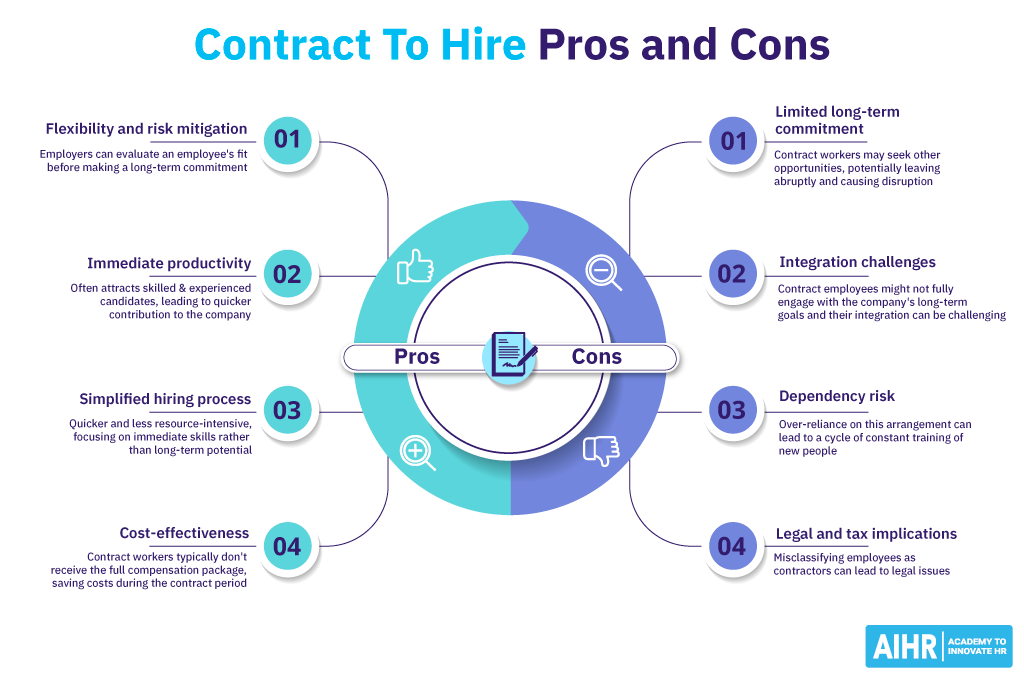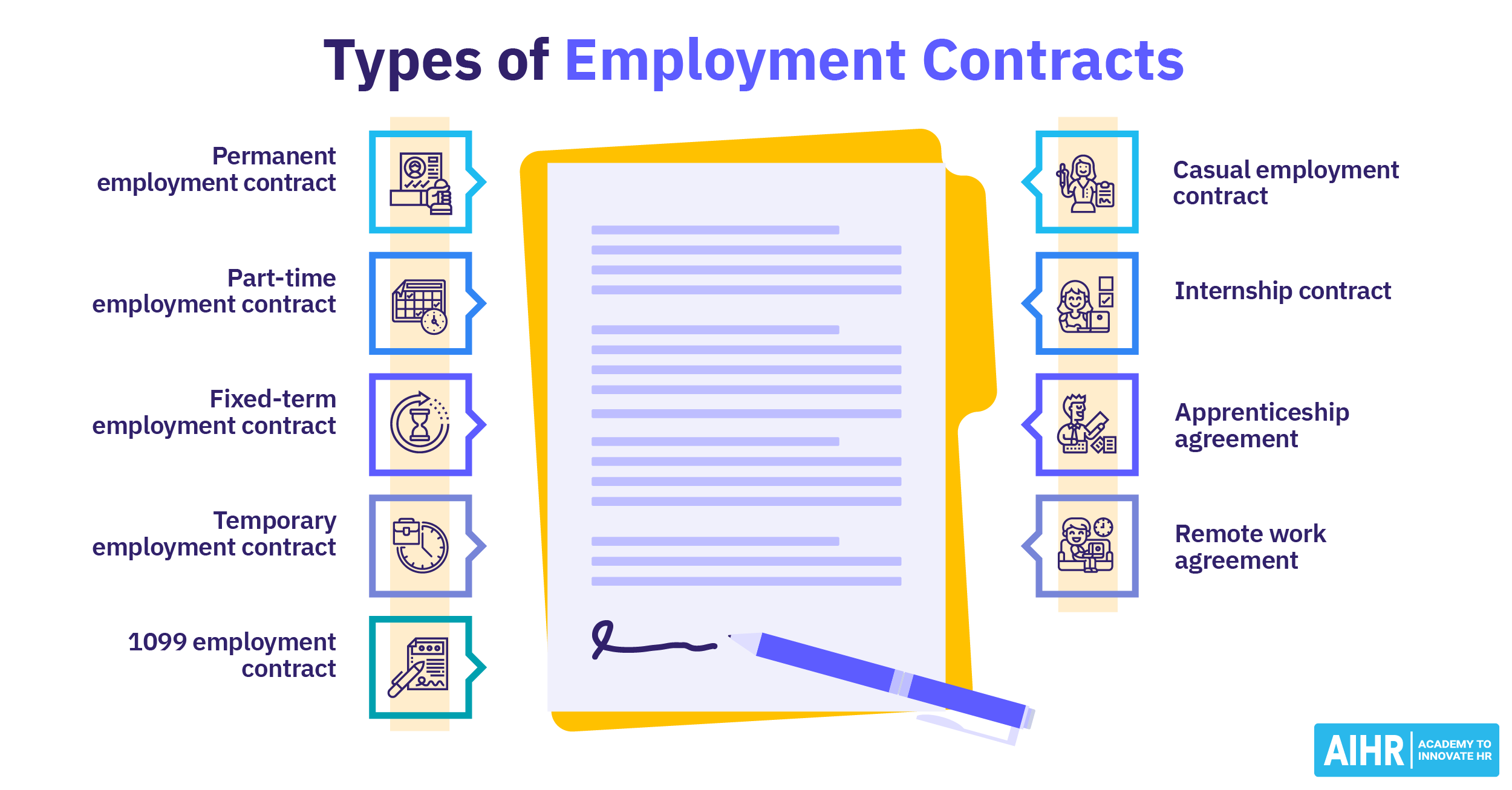Contract To Hire
What is contract to hire?
A contract to hire, also known as ‘temp to hire,’ is a type of employment agreement that begins as a temporary or contract position but has the potential to become a permanent job after a specified period. This approach is often used by employers to evaluate a worker’s performance and fit within the company before committing to a full-time, permanent employment offer.
What is a contract to hire position?
A contract to hire position is a type of job arrangement where an individual is initially hired on a temporary contract with the possibility of being offered a permanent position at the end of the trial period. Typically, this initial phase involves the employee working as a contractor, often sourced through a staffing agency rather than directly by the hiring company. The duration of this period varies, but it generally spans from a few months up to a year.
How does contract to hire work?
Here is how this type of employment agreement typically works:
- Initial agreement: The employer and the employee enter into an agreement where the employee is hired for a temporary period, which can range from a few months to a year.
- Working phase: During this phase, the individual performs tasks and responsibilities like a regular employee.
- Evaluation: During the contract period, the employer evaluates the employee’s performance, skills, and how well they integrate with the team. Simultaneously, the employee gets a chance to understand the role of the work environment and decide if it aligns with their career goals.
- Decision to hire (or not): At the end of the contract period, the employer decides whether to offer the employee a permanent position based on the previous evaluation.
- Transition: If the decision is positive, the employee transitions to a permanent status, often with changes in benefits and employment terms.
Contract to hire vs. direct hire
Some of the key differences between contract to hire and direct hire are:
Employees are initially hired for a temporary contract with the possibility of full-time employment
Employees are hired directly on a permanent basis without a temporary period
Offers high flexibility, allowing employers to adjust their workforce based on project needs and employee performance
Offers less flexibility in workforce adjustments due to more complex HR processes involved in staffing changes
Contract employees typically receive fewer benefits during the contract period
Employees receive full benefits from the start, including health insurance and retirement plans
There can be higher turnover if contract employees choose not to stay or are not offered permanent positions
Potentially lower turnover, as employees are selected for their suitability in long-term roles
The difference between contract and contract to hire
Contract and contract to hire are two different types of employment agreements. A contract position is a short-term, project-based engagement where an individual is hired to perform specific tasks or services without the promise of long-term employment. In this arrangement, the worker typically operates as an independent contractor.
Conversely, a contract to hire position is initially temporary but with the potential to become a permanent role, allowing both parties to assess suitability before committing to a long-term employment relationship.
Contract to hire pros and cons
Pros:
- Flexibility and risk mitigation: Employers can assess the fit of the employee with the company culture and the specific job requirements before making a long-term commitment.
- Quicker integration: Contract to hire positions often attract candidates who are skilled and experienced, allowing for a shorter onboarding time and quicker contribution to the company.
- Simplified hiring process: The hiring process can be quicker and less resource-intensive compared to permanent hiring, as the focus may be more on immediate skills and experience rather than long-term potential.
- Cost-effectiveness: Contract workers might not receive the full compensation package that permanent employees do, which can save costs for the employer during the contract period.
Cons:
- Limited long-term commitment: Contract workers might be simultaneously exploring other job opportunities. If they find a more appealing permanent position elsewhere, they might leave, causing disruption.
- Integration challenges: Contract employees may not be as invested in the company’s long-term goals, and integrating them into the team can be challenging if the permanent staff views them as temporary.
- Dependency risk: Relying too heavily on a contract to hire arrangement can lead to a cycle where the company is constantly training new people, which can be inefficient and costly.
- Legal and tax implications: Misclassifying employees as contractors can lead to legal complications. It’s crucial to adhere to labor laws and regulations regarding contract workers.

What should HR include in a contract to hire agreement?
When drafting a contract-to-hire agreement, HR should consider including the following key elements:
- Job description and duties: Clearly define the role, responsibilities, and expectations for the position during the contract period.
- The duration of the contract: Specify the length of the temporary contract period before a decision is made about permanent employment.
- Compensation and benefits: Detail the salary or hourly rate, as well as any benefits (such as health insurance, paid time off, etc.) that the employee is eligible for during the contract period. Also, mention any changes in compensation or benefits if the role becomes permanent.
- Performance evaluation criteria: Outline the criteria or goals that the employee is expected to meet during the contract period for consideration of permanent employment.
- Termination conditions: Specify the conditions that allow each partner to terminate the contract, including notice periods and any obligations upon termination.
- Confidentiality and non-disclosure agreements: If applicable, include clauses that protect sensitive company information.
FAQ
Contract to hire employment is a hybrid staffing arrangement that combines elements of both temporary and permanent employment. Initially, an individual works as a contractor for a set period, allowing both the employer and employee to assess suitability. If successful, the contract may lead to a permanent position, offering a trial period for both parties to evaluate the fit.
Contract to hire employees typically do not receive the same benefits as permanent staff during their contract period. They are usually employed through a staffing agency, which may offer limited benefits.







